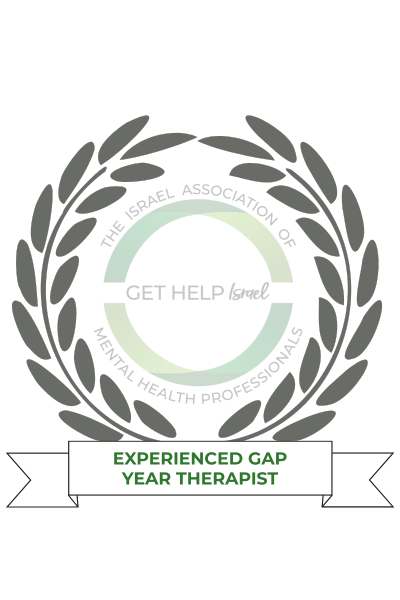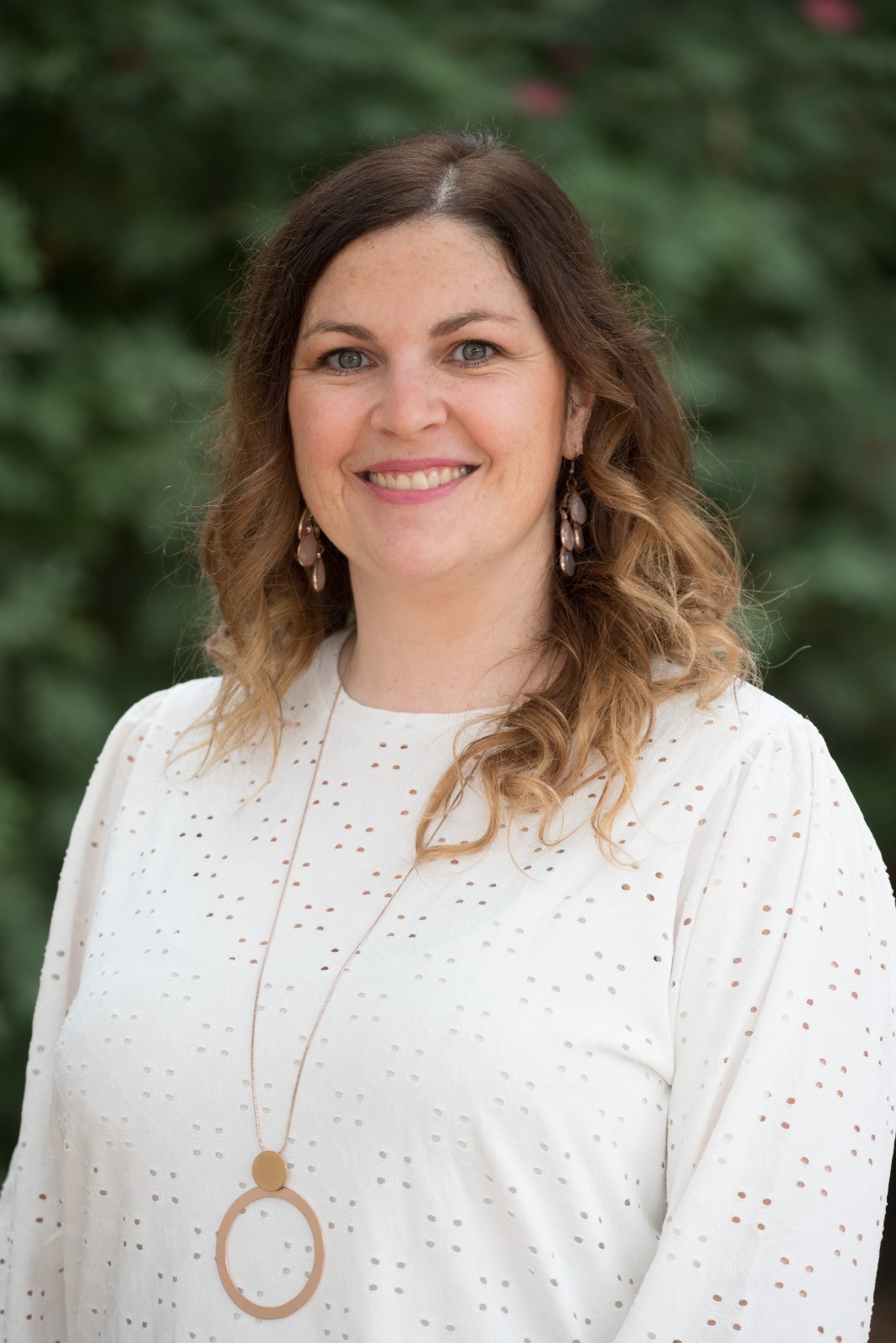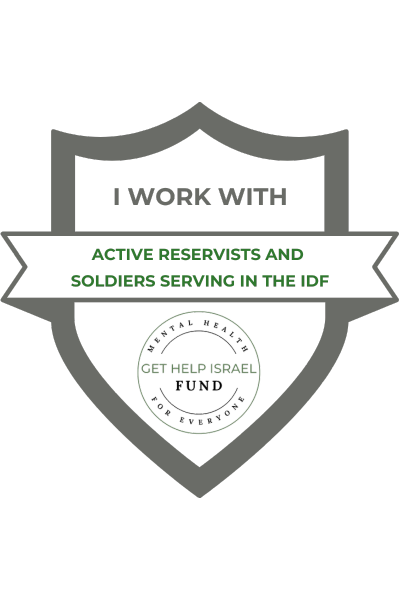Leah Prejserowicz
Credentials
Finances
- Ahuza 127
- Raanana
Leah Prejserowicz
 Verified
Verified
Credentials
Expressive Arts Therapist, Psychotherapist
MA
Finances
350-500 NIS
Private Insurance
Sliding Scale | Free Consultation
- Ahuza 127
- Raanana
ABOUT THE THERAPIST
Leah is an experienced facilitator and psychotherapist with diverse skills in both clinical and corporate areas. She brings over 15 years experience as a therapist in both the public and private sector in Israel.
Leah uses her skills and experience as an 'olah' to help clients deal with adjustment in Israel, cultural differences, understanding the system and working towards supporting her clients through difficult times. She specializes in treating anxiety, OCD and working through various relationships challenge our own personal development.
Leah offers a client-centred approach and works in full cooperation with clients in determining their goals and working towards them as partners. She offers a practical and direct approach to creating change and offering coping skills.
Leah also runs corporate workshops in Dealing with Anxiety, Parenting through the War, and Helping Combat Soldiers readjust to the workplace. She works with individuals, couples and parents in Ra'anana and on Zoom, and offers session in both English and Hebrew.
QUALIFICATIONS
MA
Tel Aviv University
2014
Degree
MAEducation
Tel Aviv UniversityYear of Graduation
2014Years in Practice
10
ADDITIONAL CREDENTIALS
Cognitive Behavioral Therapist - 2021
Animal-assisted Psychotherapist - 2008
Expressive Arts Therapist - 2014
DISTANCE COUNSELING
Online Therapy
PRIMARY SPECIALTIES
Anxiety / Panic
Obsessive Compulsive Disorder (OCD)
Parenting Issues / Training
Phobias
Self-Esteem
ADDITIONAL SPECIALTIES
Anger Management
Behavioral Concerns In Children
Couples / Relationship / Marriage Counseling
Developmental Disorders
Family Issues
Trauma / Post Traumatic Stress Disorder PTSD
CLIENT FOCUS
Population
Adults
Couples
Men
Women
Parents
Languages Spoken
Hebrew
English
TREATMENT APPROACH
Art TherapyArt therapy has clients express themselves through creative mediums such as drawing, painting, collage, coloring, or sculpting. Clients can interpret their subconscious world that is expressed in their art which could lead to a better understanding of their feelings and behavior. Artistic talent is not a prerequisite for art therapy as it’s not as much about the end result as much as it is about the process. The therapist looks for meaning in the creative choices of the work and the clients’ inner world. This therapeutic method enables clients to express their inner thoughts and feelings through creative expression rather than just talking about them.
Attachment-Based Family Therapy (ABFT)Attachment-based family therapy (ABFT) is a form of psychotherapy that focuses on the family's relationships and communication patterns. It is based on the theory that strong and secure attachments between family members are essential for emotional health and well-being. The goal of ABFT is to identify any problems in family relationships, enable family members to become more attuned to each other’s needs, and build a secure bond between them. It also helps family members to practice healthy communication skills, learn effective problem-solving strategies, and build trust within the family.
Body PsychotherapyBody psychotherapy is an integrative psychotherapy approach that combines psychodynamic, humanistic, and somatic approaches with the goal of treating psychological and physical distress. It emphasizes the connection between body and mind, and works to increase awareness of physical sensations and emotions. Body psychotherapy practitioners may use a variety of techniques, including mindfulness, body postures, breath work, relaxation, and sensory awareness, to help clients become more aware of their bodies and to learn how to use this awareness to improve their overall wellbeing.
Body-Mind PsychotherapyBody-mind psychotherapy is an integrative approach to psychological treatment that draws from both psychotherapeutic and somatic/body-based approaches. It emphasizes the interconnection between physical, emotional, cognitive and spiritual aspects of being. This approach seeks to help individuals explore how physical sensations, emotions, thoughts and beliefs influence their behavior and well-being. Through this exploration, individuals can gain insight into how the body and mind interact to create patterns of behavior, and how those patterns can be changed to promote healing and wellness.
Cognitive Behavioral Therapy (CBT)Cognitive Behavioral Therapy (CBT) is a type of psychotherapy that focuses on how one's thoughts, feelings and behaviors are connected and can be changed. It is based on the idea that how we think (cognition) and how we feel (emotion) can influence how we behave. CBT helps people identify and challenge distorted thinking and replace it with more balanced thinking, leading to improved mood and behavior. ‘Homework’, usually containing practical writing exercises, is often completed by the client between sessions to reinforce the therapy. Examples of tools that practitioners often use are journaling, challenging beliefs, and mindfulness.
Equine-Assisted TherapyEquine-assisted therapy (EAT) is a form of experiential therapy that uses horses to help people with physical, emotional, mental, and behavioral issues. Through activities such as grooming, feeding, and riding horses, individuals are able to develop trust, self-confidence, and problem-solving skills. The therapy may also involve activities such as horse-shoeing and caretaking of the horse (riding is not mandatory). Equine-assisted therapy is beneficial for individuals with a wide range of needs, including individuals with autism, attention deficit hyperactivity disorder (ADHD), anxiety, PTSD, and depression.
Expressive Arts TherapyExpressive Arts Therapy is particularly beneficial for clients who struggle with describing what they are feeling verbally. Through imagination and creation of different art forms, clients are able to interpret and communicate their inner world and catalyze healing. Expressive arts therapy can involve the use of multiple modalities, such as visual arts, music, movement, drama, storytelling, poetry, and play. It is used to help individuals of all ages, including children and adults, to explore their feelings, reconcile emotional conflicts, foster self-awareness, manage behavior and addictions, develop social skills, improve reality orientation, and solve problems.
Family Systems TherapyFamily Systems Therapy is an approach to psychotherapy that emphasizes the importance of understanding how the family functions as a whole, and how individual family members interact and affect one another. It focuses on how family dynamics, such as communication patterns, roles, and power dynamics, shape behavior, and how changing these dynamics can lead to positive change. Family Systems Therapy is a collaborative approach, where the therapist works with the family as a whole to identify and address areas of conflict and distress.
Internal Family Systems (IFS)Internal Family Systems (IFS) is an evidence-based psychotherapy that uses the metaphor of an internal family of parts to help people gain awareness of how different parts of themselves can interact in healthy and unhealthy ways. IFS encourages people to become curious about their different parts, with the goal of helping them gain access to their true Self or core. Through this process, people can learn to recognize and care for the different parts of themselves, as well as develop compassionate understanding for the origins of their parts. A key principle of IFS is that each part within the person has its own positive intention and is trying to protect the person in some way. By understanding the positive intention of each part, the practitioner and client can work together to help the parts feel heard and understood, and to find more adaptive ways of meeting their needs. IFS has been found to be an effective treatment for a variety of mental health issues, including depression, anxiety, trauma, and relationship issues.
Mindfulness-Based Cognitive Therapy (MBCT)Mindfulness-Based Cognitive Therapy (MBCT) is a form of therapy that combines cognitive behavioral therapy with mindfulness practices. It is based on the idea that our thoughts, emotions, and physical sensations can affect our mental health. MBCT helps individuals become aware of their thoughts, emotions, and physical sensations in order to gain insight and control over them. MBCT helps clients learn how to recognize their sense of being and see themselves as separate from their thoughts and moods. This separation can free the client from thought patterns in which the repeated negative messages may be dominating the client’s focus. After developing an awareness of the separation between thoughts, emotions, and the self, people in treatment may find that while the self and the emotions may exist simultaneously, they do not have to exist within the same dimension. The healing can take place when one learns how to interject positive thoughts into negative moods and thereby create a shift in mood.
Psychodynamic TherapyPsychodynamic therapy is a form of therapy that focuses on the unconscious mind and how it affects behavior. It works to help people understand and work through past experiences and feelings that may be causing difficulties in the present. This type of therapy encourages individuals to explore their emotions, relationships, and behaviors in order to gain insight into their current difficulties. It can help individuals better understand themselves and their motivations, and gain insight into how past events have impacted their current lives. People tend to develop defense mechanisms when faced with challenges in life. Defense mechanisms may keep painful feelings, memories, and experiences in the unconscious. A few common defense mechanisms include: denial, repression, and rationalization. Psychodynamic therapists encourage people to speak freely about their emotions, desires, and fears. Being open may help uncover vulnerable feelings that have been pushed out of conscious awareness. According to psychodynamic theory, behavior is influenced by unconscious thought. Once painful feelings are brought forth and processed, the defense mechanisms are no longer needed and a person in treatment can start changing unhelpful patterns when coping with life’s challenges.
Schema TherapySand tray therapy allows a person to construct their own microcosm using miniature toys and colored sand. The scene created acts as a reflection of the person’s own life and allows them the opportunity to resolve conflicts, remove obstacles, and gain acceptance of self. Schema therapy is based on the belief that early maladaptive schemas form when emotional needs such as affection, guidance, love, shelter, and safety, go unmet in childhood. These maladaptive schemas, which can be described as ways that individuals interpret life events, can later lead to them making unhealthy choices, forming toxic relationships, lacking healthy boundaries or social skills, engaging in destructive behavior patterns, having a poor sense of judgment, and experiencing feelings of worthlessness or self-doubt. Discovering the origins of one’s unmet emotional needs and learning to create nurturing relationships through schema therapy can help people begin to build feelings of trust, self-worth and adequacy.
Trauma-Focused Cognitive Behavioral Therapy (TF-CBT)Trauma-Focused Cognitive Behavioral Therapy (TF-CBT) is an evidence-based practice used to help children, adolescents and their parents who have experienced a single or multiple traumatic events. This type of therapy combines cognitive and behavioral strategies to help people process their traumatic experiences, manage their distress, develop coping skills, and restore their sense of safety and well-being. TF-CBT focuses on education and skill-building, creating an environment of safety and trust, and using therapeutic activities to help people understand their responses and control their symptoms. Children are shown how perceptions may be distorted and are given the tools to redesign those perceptions. TF-CBT is a skills-based model, and it requires the child and parent to practice its components in order to be optimally effective. Parents and children are commonly asked to practice skills at home.
SERVICES OFFERED
Individual Therapy
Group Therapy
Couples Therapy
Consultation
Workshops/Educating
Hadrachat Horim
PROUD PARTICIPANT

Therapist's Experience with Gap Year Students
I work with students and gap year students on independence, anxiety, relationships and OCD. Whether dating or dealing with roommates, or being away from family, each student brings their own unique challenge that we can explore together and find ways to cope better.

 Verified
Verified


